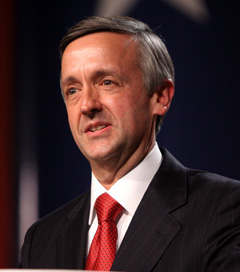Robert Jeffress, pastor of First Baptist Church of Dallas and a supporter of Texas Gov. Rick Perry, stirred up trouble by saying in public what many evangelical Christians say privately: Mormonism is a cult.
If he's right and the Church of Jesus Christ of Latter-day Saints (the formal name of the Mormon church) is a cult, then the Southern Baptist Convention – to which Jeffress' congregation belongs – is a bit cultish, too.
Perhaps before we start throwing around such a term, some definitional work is required.
“Cult” is most commonly used pejoratively, to describe a religious group that undermines people's independence and individuality. If the group requires you to renounce your family or community, turn over your property to the group and follow a charismatic figure without question, most people agree it's a cult and unhealthy.
For some Christians, “cult” also means any religion that does not adhere to their interpretation of Christian teaching. From this point of view, Muslims and Hindus obviously belong to cults. Many would agree that Mormons, who consider the Book of Mormon to be scripture, qualify. Some even suggest that Roman Catholics are part of a cult.
But look at any list of cult characteristics, and it becomes clear that the distinction between a religion and a cult is fuzzy. For example: “Cults claim to be the only true way to live and the path to salvation.” On that criterion, many evangelical Christians belong to a cult.
We should reject any religion that routinely manipulates and/or abuses its members, but within every religious group there are people using doctrine and dogma to manipulate and abuse. Humility suggests we look within our own traditions before condemning others. There's something about that in the Gospels (Luke 6:41-42 comes to mind).
And we should remember there is another approach possible. The Latin “cultus,” from which “cult” is derived, can mean reverence and care. To cultivate the land, for example, implies not just tending, but honoring the land.
What would it mean to revere or care for a God or gods? That depends on one's understanding of the divine. I use the term “God” to name the mystery of the world that is beyond our capacity to understand. Instead of suggesting “God is a mystery,” I believe “God is mystery.” The first formulation, with the indefinite article, implies that God is an entity, force or being with some shape, but that God's contours are beyond our capacity to comprehend. The second suggests that God is simply the name we give to what is beyond our capacity to understand. God is not a mystery, but rather another name for mystery.
From that view, to care for God is to care for the mystery that is Creation. Science has allowed us to understand many things about the world, but we humans can never fully understand such a complex universe. We are charged to care for it, to be careful. We are clever enough to intervene in the world, but we often do unintended damage. We plow the soil to grow food, and soil erodes. We burn fuels that destabilize the climate. When we try to fix what we have broken, we often compound the damage. Attending to the duty to take care would check our arrogance.
I use the term “Creation,” though I don't believe there was a creator, to signal my respect for this mystery. Creation implies a wonder and awe for all that is around us, from the working of a single cell to the immense complexity of the universe. Reverence and care seem appropriate, as we struggle to find our place in a mystery greater than us and greater than we can understand.
Our task is to take care, to be careful, not mistaking our cleverness for wisdom. Perhaps the most important function of the concept of God is to remember what we are not gods. We are human, part of that Creation, not beings who can intervene in Creation without consequence.
In this sense, we all should think of our cultic duties. In this sense, I embrace my membership in a cult, the congregation of St. Andrew's Presbyterian Church in Austin, Texas.
When we view religion as the struggle to deepen our understanding of the mystery of Creation, using our stories and science, we can evaluate a religion on some universal criteria rather than dogma: Does a religion help connect people in loving community? Does a religion challenge our prejudices and help us face our fears, so that we may love more fully? Does a religion help us recognize our limits as it also helps us reach our potential? And, most importantly, does a religion teach us to take care?
Thank you for reading Truthout. Before you go…
…We ask that you take just a second to read this message.
We are up against a far-reaching, wide-scale attack on press freedom coming from the Trump administration. Since his inauguration last year, we’ve seen frightening censorship, a right-wing takeover of the news industry, and worsening financial conditions for progressive nonprofits across the board.
We can only resist Trump’s agenda by cultivating a strong base of support. The right-wing mediasphere is funded comfortably by billionaire owners and venture capitalist philanthropists. At Truthout, we have you.
We need your help to sustain the fight against authoritarianism in 2026. Please take a meaningful action in this fight: make a one-time or monthly donation to Truthout. If you have the means, please dig deep.
